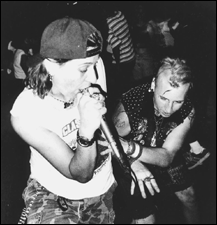
RISE ABOVE: THE TRIBE 8 DOCUMENTARY: Lynn Breedlove loves penises, especially the detachable kind.
|
Far more entertaining and enlightening are the home movies of Darren Stein and Adam Shell in Put the Camera on Me (2003; screens May 23 at 5:30 p.m.), which is kind of like Capturing the Friedmans conceived
as a Disney kids movie. Growing up in a sheltered community, Stein,
who’s now a professional filmmaker, and his friend Shell and a number
of children in the neighborhood collaborated to make some 50 movies
ranging in genre from musical to noir. Filming a chorus line from The Rocky Horror Show with
some of the little boys in drag might seem cute and precocious, but as
the neophyte auteurs move on to such subjects as sex, violence, and
gender preference, the little movies become more a case study than a
coy memoir. Intercut with present-day interviews with the principals,
some but not all of whom are, like Stein, as "Gay As a Whistle" (the
title of one of the films), these earnest and perverse gems show not
only the growth of a cinematic imagination but the subtle dynamics of
peer manipulation and sado-masochism that is movie directing. How
disappointing that Stein, in whom we see glimmers reminiscent of
directors ranging from Kenneth Anger to Steven Spielberg to Rainer
Werner Fassbinder, ended up making a piece of piffle like Jawbreaker (1999). Maybe what I like about Turn the Camera on Me is that, unlike It Will Probably Pass, it’s engagingly self-centered without being self-pitying. But both films pale before Ruthie Shatz & Adi Barash’s Garden (2003;
May 16 at 12:30 p.m., co-presented by the Boston Jewish Film Festival).
Nino and Dudu, teenage Arabs who hustle for a living in the Tel Aviv
pick-up district of the title, make the hard times of Midnight Cowboy look
like a game show. The product of abusive or disintegrated families and
a brutally divided society, the two have been on the street since
childhood, dodging pedophiles, gangsters, and both the Palestinian
Secret Police and the Israeli Secret Service. They survive on drugs,
brute cunning, prostitution, and their own seemingly unbreakable, often
contentious, and remarkably noble love. Such a bond is also
apparent among the lesbian punk-band members, all survivors of abuse,
discrimination, addiction, and worse, who are profiled in Tracy
Flannigan’s Rise Above: The Tribe 8 Documentary (2003;
May 15 at 8 p.m., with the director and band members Lynn Breedlove and
Leslie Mah present). That is, once you get past the shirtless,
obscenity-laden, hilarious outrage of Tribe 8’s stage act. Liz Phair
material they are not (though after shocking the Birkenstocked faithful
at the 1992 Michigan Womyn’s Music Festival, they were invited back
four times). They make Courtney Love seem like just another talk-show
guest as they pound out three chords and bellow witty and assaultive
lyrics about sadism, masochism, sexism, and rage. In between sets, lead
singer Lynn Breedlove, an Iggy Pop with breasts, invites straight men
to come up on stage and suck off a 12-inch strap-on. On the other hand,
she might just pull out a Bowie knife and slice the thing off. The
point, in part, is parody, though they don’t care whether they offend
anyone and rather hope they do. Neither do they hate men. "We like
penises," says Breedlove. "Especially the detachable kind. And all
penises are detachable." Talk about cutting-edge. But even these
seeming reprobates show signs of slowing down. Some have dropped out of
the band and turned to more conventional careers, even marriage
(same-sex, of course). "You never have to grow up!" asserts the
fortysomething Breedlove, rather unconvincingly, to fans half her age. Perhaps
an individual can be not only simultaneously male and female but also
young and old, parent and child? That might be the theme of Aleksandr
Sokurov’s Father and Son (2003; May 22 at 6:30 p.m.). It’s anyone’s guess. Forget Turgenev; Father and Son may
be the festival’s most outré — and gayest — entry. Sokurov would
vehemently deny both charges, especially the latter (the product of
"sick European minds," he has said). But if anything is clear in this
radiantly obscure parable, it’s that the opening embrace between dad,
who looks like a candidate for Tom of Finland, and his willowy and wiry
son, more the Bruce Weber type, is not just paternal and filial. Turns out it’s only a bad dream. Or something (and you thought The Return was
cryptic!). Set in an uncanny seaside city suffused in a golden,
unearthly light, the film takes place mostly on a rooftop that looks
sometimes like a set from Mary Poppins and sometimes like one from Querelle.
The plot — the boy is in military school, his girlfriend is dumping
him, dad’s an army vet with a troubling lung X-ray, a young man visits
who is the son of dad’s war buddy — seems half-baked and distracting.
Which may be the point, though I preferred the limpid simplicity of its
predecessor, Mother and Son (there will be a third in this series). Unlike many of the other entries in this festival, Father and Son is not family fare.
page 1
page 2
|













